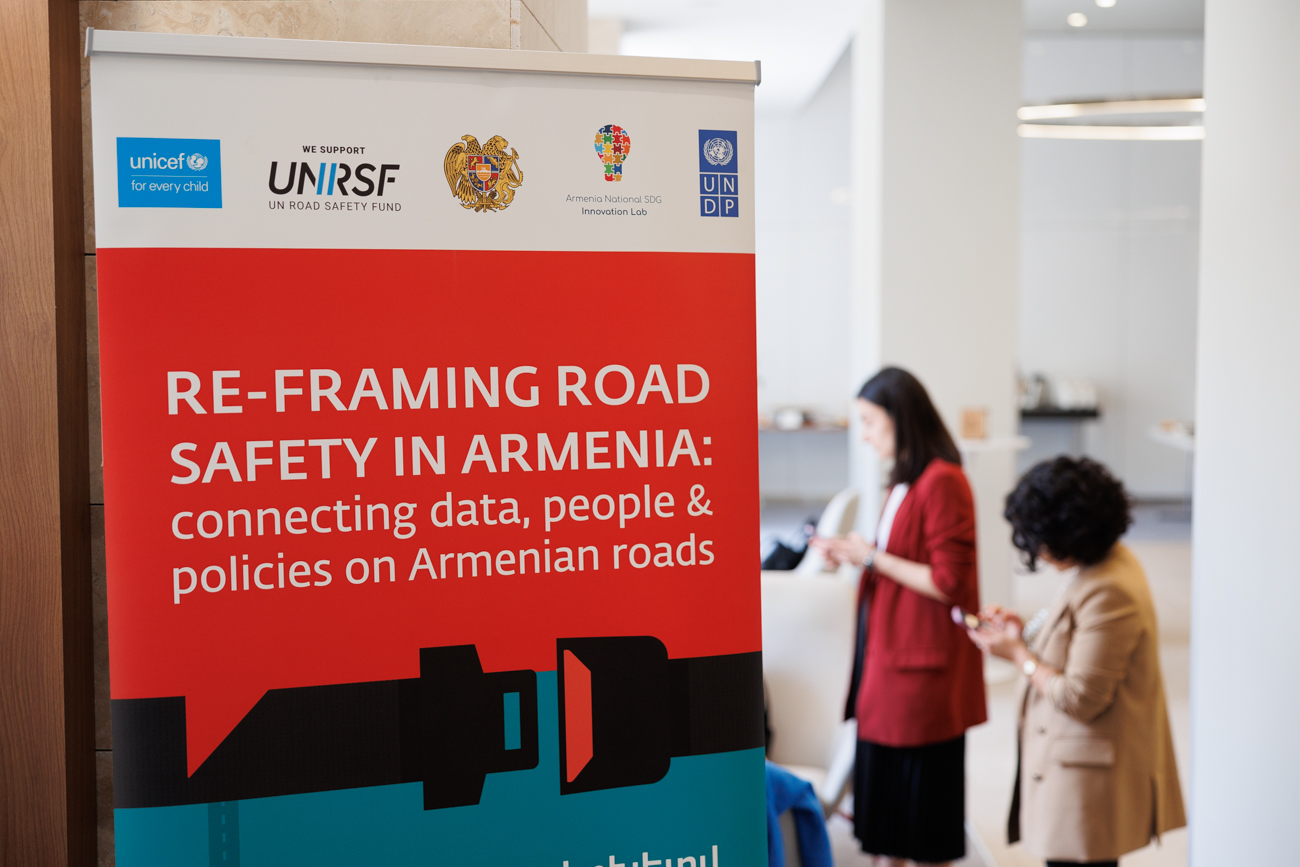The transformative initiative used innovative tools and methodologies to enhance road safety in Armenia, contributing to the reduction in road deaths by 2030.
Re-framing road safety in Armenia Connecting data, people, and policies for safer roads
April 25, 2024

On 23 April UNDP and UNICEF in Armenia closed a joint project on reframing road safety in Armenia, funded by the United Nations Road Safety Fund (UNRSF).
The overall objective of the “Re-framing road safety in Armenia: connecting data, people and policies on Armenian roads” project was to help inform and implement the National Road Safety Strategy in the country through the establishment of a new integrated database and experiment-informed policy-making practices, and facilitate coordination, planning and evaluation of road safety interventions, thus contributing to achieving a reduction of road deaths by 2030. This required a combination of various innovative methodologies, including data analytics, digitalization, and fostering behavioral change.
Natia Natsvlishvili, UNDP Resident Representative in Armenia, welcomed the guests and highlighted the importance of innovative methodologies implemented by the UNDP in the framework of the project. “This project, which was implemented in close collaboration with the Ministry of Territorial Administration and Infrastructure (MTAI), as well as the Ministry of Internal Affairs and Yerevan Municipality, has paved the way for more systematic and comprehensive initiatives in reducing the number of road accidents, fatalities and injuries in Armenia. We stand ready to leverage innovation and transformative change to make the roads of Armenia safer for everyone, now and for generations to come.”
As part of our data analytics and visualization efforts, the first real-time road accident black spot data analytics platform in the region was developed, enriched with real-time data encompassing over 23,000 road accidents resulting in fatalities or injuries nationwide.
Leveraging insights gleaned from data analytics, UNDP’s SDG Innovation Lab implemented a pilot intervention. Kristine Ghalechyan, Deputy Minister of Territorial Administration and Infrastructure, reflected on the pilot intervention — based on the insights from the road accident black spot data analytics platform — along the Yerevan-Proshyan highway, strategically focusing on one of the country's most critical black spots. “Such initiatives empower policymakers to make evidence-based decisions leveraging big data analytics and behavioral interventions. The MTAI has endorsed the pilot intervention near the Proshyan settlement of the M1 interstate highway as an exemplary result of data-driven and evidence-based decision-making facilitated by UNDP in Armenia,” he stressed.
In addition, behavioral interventions, also inspired by the insights generated from data, effectively engaged more than 21,000 drivers previously penalized for speeding. Remarkably, our efforts yielded an 18 percent reduction in speeding-related road traffic violations, setting a notable precedent for effective behaviorally informed communications strategies.
Arpine Sargsyan, Deputy Minister of Internal Affairs reflected on these interventions mentioning: “This project has effectively tackled multiple critical aspects related to road safety in Armenia, including data analysis for identifying black spots, targeted road interventions, and behavioral interventions aimed at addressing speeding drivers. It is through such innovative and multifaceted initiatives that we can achieve desired outcomes via data-driven, evidence-based decision-making, and policy development. We look forward to the continuation of such impactful initiatives.”
The Head of the UN Road Safety Fund Secretariat, Mrs. Nneka Henry also delivered opening remarks highlighting the importance of such projects for road safety. “By leveraging cutting-edge strategies and technologies, the UNRSF aims to revolutionize road safety measures across the globe, ensuring a safer environment for all road users. Innovation is key to addressing the complex challenges of road safety, and this project exemplifies our commitment to adopting forward-thinking solutions to save lives and prevent injuries on the roads. Together with our partners, we are dedicated to reshaping the narrative on road safety and creating lasting impact across Armenia.”
As part of this project, UNICEF developed a comprehensive educational programme for young children and their parents on road safety and injury prevention and piloted it in 25 kindergartens of Tavush and Lori regions and in Yerevan. Overall, more than 500 children and about 800 parents were directly engaged in education sessions.
Following the opening remarks and presentation of project results, a panel discussion charted a course forward, emphasizing evidence-based approaches to road safety policies.

 Locations
Locations
